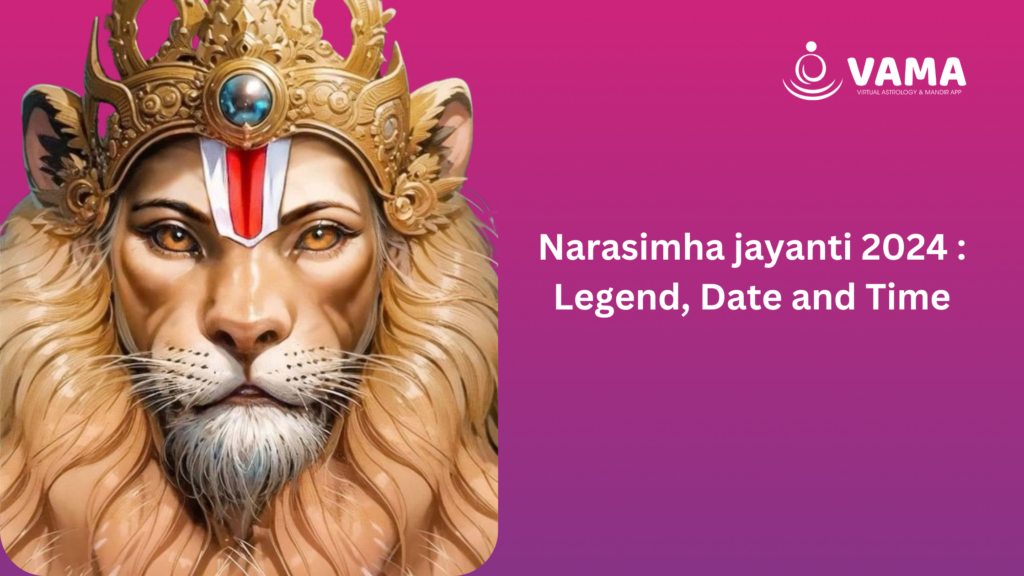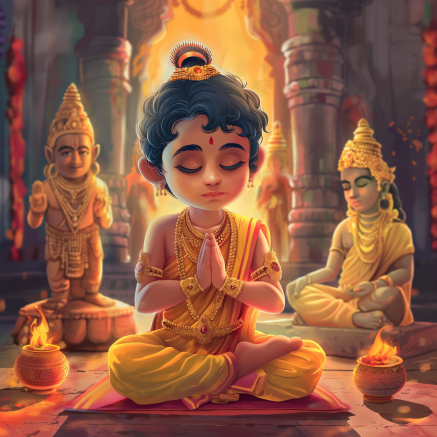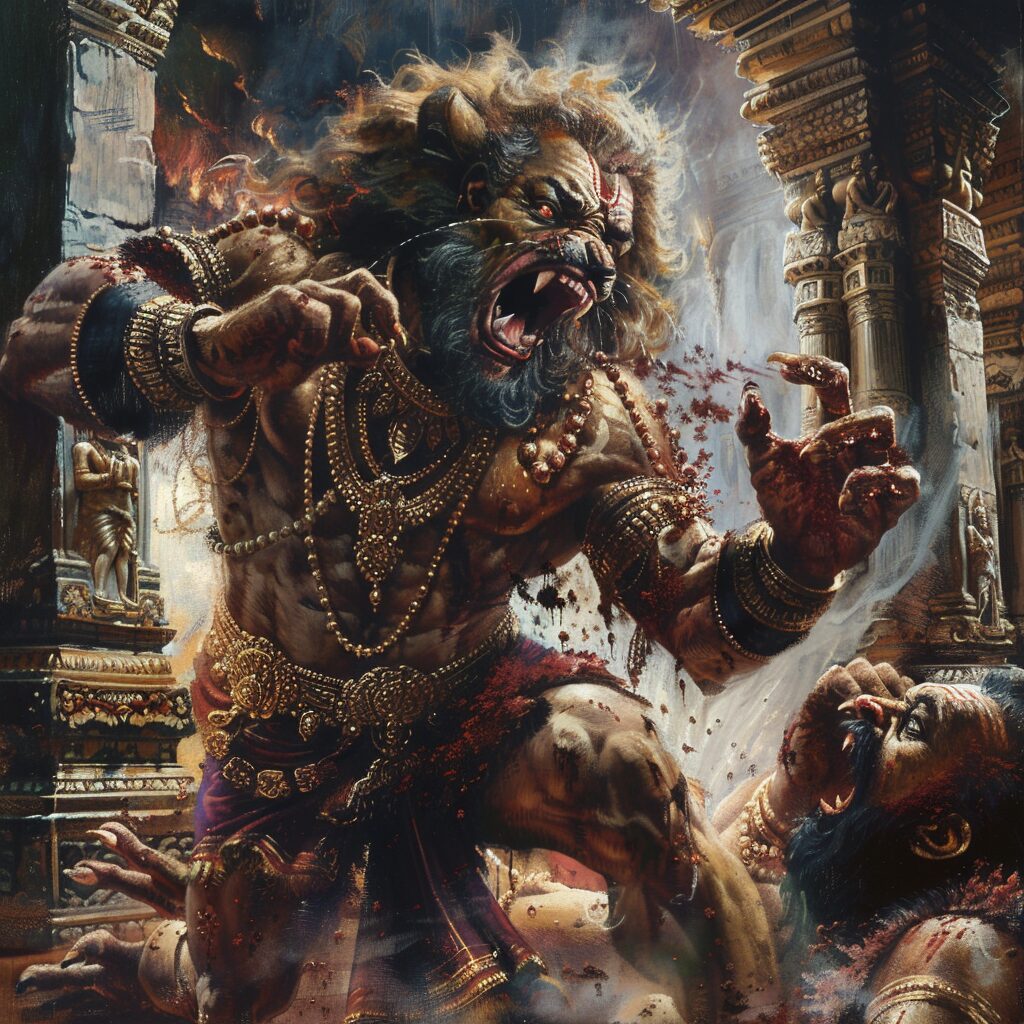Narasimha- Bhagwan Vishnu’s fourth avatar – Narasimha jayanti 2024: Date, Time & Mantra.
Narasimha Jayanti 2024 falls on Tuesday, May 21. Narasimha Jayanti celebrates the birth of Bhagwan Vishnu's fourth avatar, The Narasimha Avatar. Narasimha bhagwan is believed to have the body of a man and the head of a lion. He was born to save Prahlada and end the reign of Hiranyakashipu.

Bhagwan Narasimha’s victory is celebrated as the victory of good over evil. He is also known as the lord of destruction hence he is also called Mahakaal. Worshipping bhagwan Narasimha brings protection from unseen forces, solves legal issues, and blesses the devotee with prosperity.
Narasimha Jayanti 2024 Date & Time:
Falls on Tuesday, May 21, 2024.
Puja and Fast Timings (Muhurat):
Sayana Kala Puja Time: 04:24 PM to 07:09 PM on May 21.
Duration: 02 Hours 44 Mins.
Parana Time: Before 12:18 PM on May 22.
Madhyahna Sankalp Time: 10:56 AM to 01:40 PM on May 21.
Chaturdashi Tithi Begins: 05:39 PM on May 21.
Chaturdashi Tithi Ends: 06:47 PM on May 22.
Legend of Bhagwan Narasimha
According to ancient Puranas, there once lived a king known as Hiranyakashipu. His heart was filled with anger, having lost his brother in a battle against bhagwan Vishnu. Blinded by grief and rage, Hiranyakashipu wanted supreme power. Through years of intense sadhana and yoga, he sought a boon from Brahma Devta.
Impressed by his dedication, Brahma appeared before Hiranyakashipu. Hiranyakashipu wanted an extraordinary form of immortality – immunity from death by any means, be it man, beast, or weapon, on land, in the sky, during daylight or nightfall.
Hiranyakashipu asked, “Grant me that I not die within any residence or outside any residence, during the daytime or at night, nor on the ground or in the sky. Grant me that my death not be brought about by any weapon, nor by any human being or animal. Grant me that I not meet death from any entity, living or nonliving created by you. Grant me, further, that I not be killed by any demigod or demon or by any great snake from the lower planets.” Brahma granted this exceptional boon to the king.
Roshen Dalal (2010). The Religions of India: A Concise Guide to Nine Major Faiths
Using his newfound invulnerability, Hiranyakashipu became a ruthless ruler, demanding worship from all. Everyone succumbed to his ways except one – Prahlada, the king’s own son.

Unlike his father, Prahlada’s heart was filled with devotion for bhagwan Vishnu. This steadfast faith enraged Hiranyakashipu. He subjected Prahlada to cruel tests, hoping to break his spirit. Yet, Prahlada remained resolute, unwavering in his faith.
One day, consumed by fury, Hiranyakashipu pointed to a seemingly ordinary pillar and challenged Prahlada. “O most unfortunate Prahlada, you have always described a supreme being other than me, a supreme being who is above everything, who is the controller of everyone, and who is all-pervading. But where is He? If He is everywhere, then why is He not present before me in this pillar?”
Prahlāda then answered, “He was, He is and He will be.”
In an alternate version of the story, Prahlada answered,
“He is in pillars, and he is in the smallest twig.”
Driven by disbelief, Hiranyakashipu struck the pillar with his fist. A crack in the pillar, and Narasimha emerged – part-man, part-lion.
This form did not fall under any classification, existing beyond Hiranyakashipu’s boon. Narasimha appeared at twilight, attacked on the threshold of the house, evading the king’s protections. With razor-sharp claws, Narasimha tore Hiranyakashipu in half.

Yet, the battle left Narasimha consumed by anger . Prahlada, whose devotion set these events in motion, stepped forth. Through hymns and prayers, he pacified Narasimha, changing him into Soumya Narasimha..
The legend of Prahlada underscores the power of unwavering faith, showing that even a child’s devotion can defy the mightiest forces. It teaches that true strength lies not in power, but in the purity of the heart.
Significance of Narasimha Jayanti
On the day of Narasimha jayanti, the victory of bhagwan Narasimha is the show of victory of good over evil. Bhagwan Narasimha, also the god of protection and destruction, is known to grant protection, solve legal problems and grant wealth and prosperity to his devotees.
Narasimha Puja Mantra:
उग्रं वीरं महाविष्णुं ज्वलन्तं सर्वतोमुखम्।
नृसिंहं भीषणं भद्रं मृत्युमृत्युं नमाम्यहम् ॥
Meaning: May Lord Narasimha, who is highly ferocious and brave and the emanation of Lord Maha Vishnu, full of effulgence, terrific and auspicious and the death of death blesses us as we bow down to Him.




